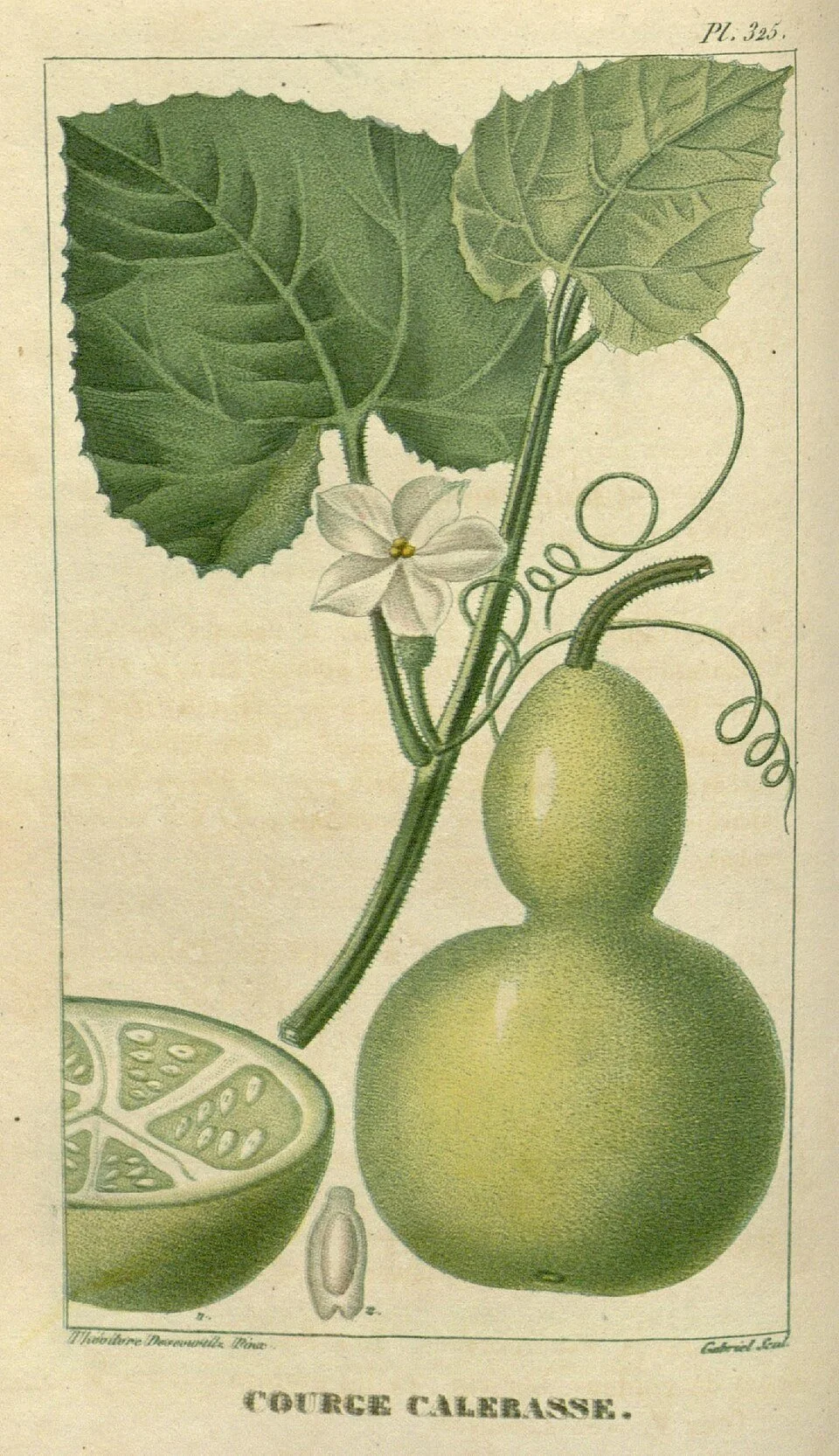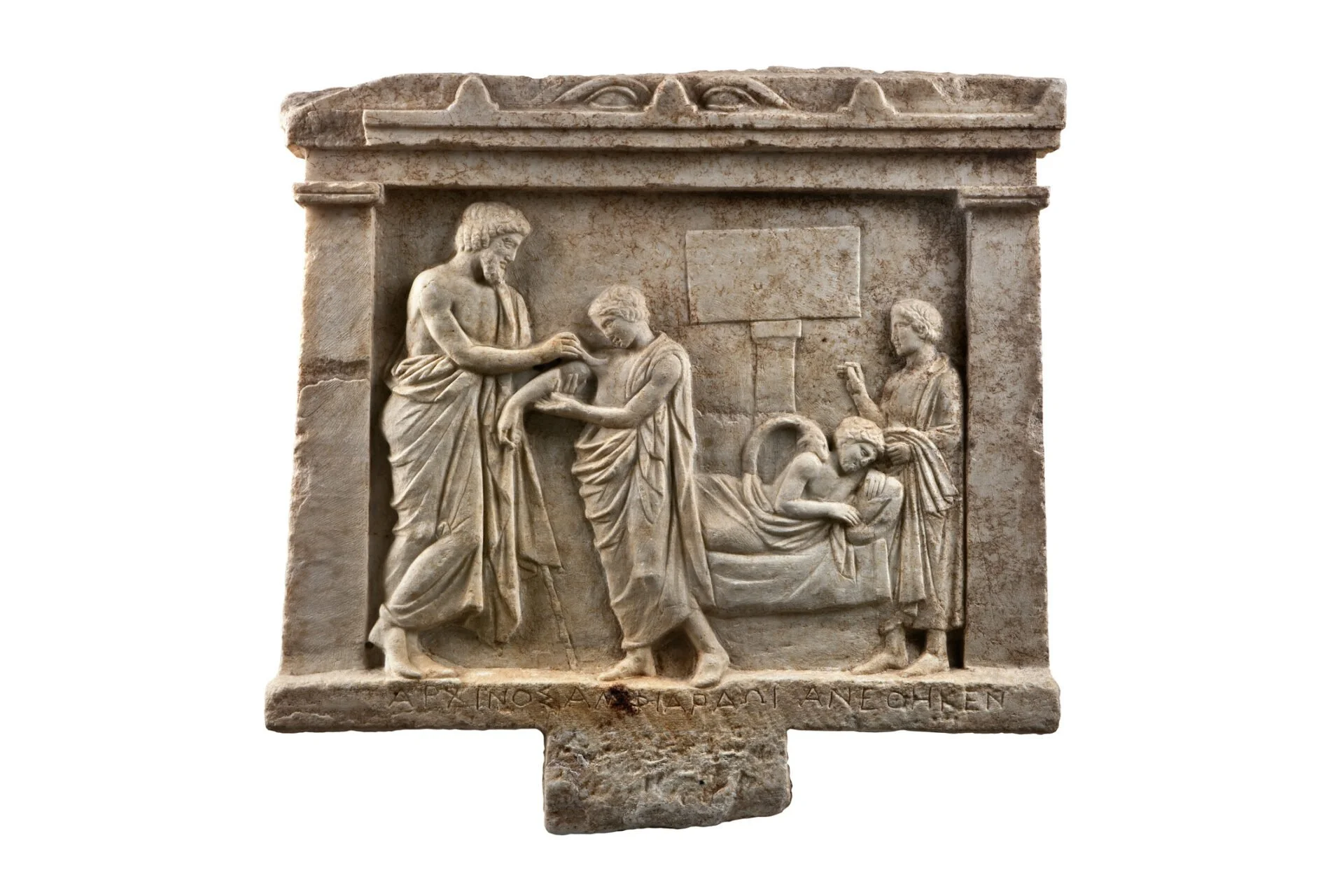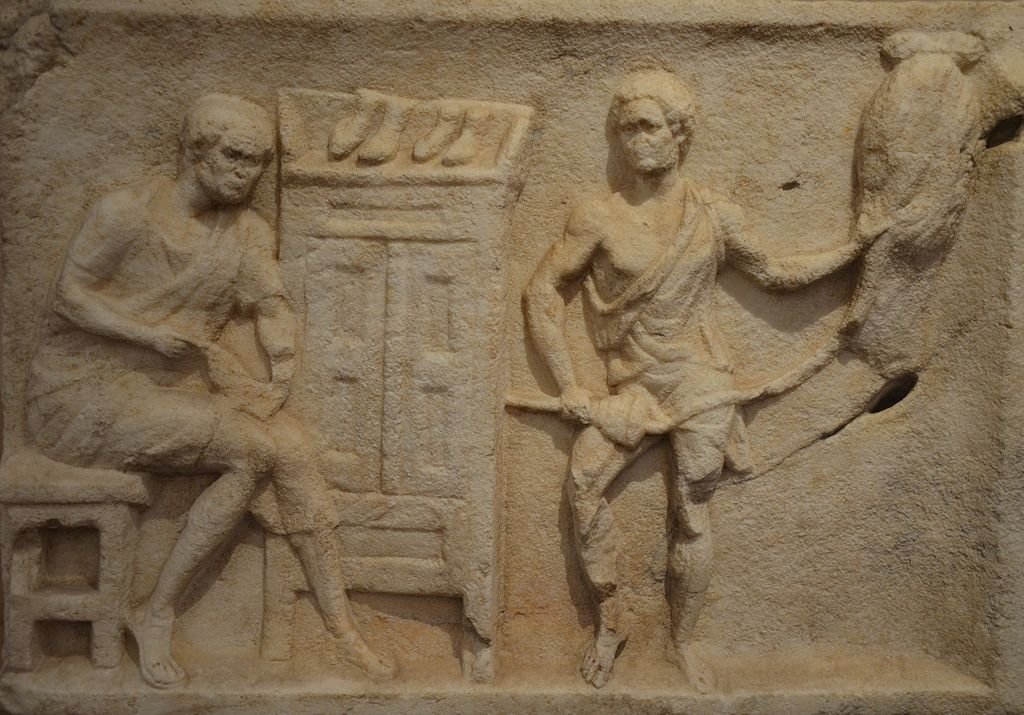This preface has been edited and translated in part before by Petit 2017: 56–59 and Petit 2020: 100–101.
Galen’s Simple Drugs 10 preface
Nothing of what I am now about to say will be very beneficial to those who don’t know what I said at the beginning of this treatise in the first five books. Perhaps it will even be harmful for someone to use the drugs described here without a method. So, my lecture will assume you have learned that material, and I will start by recalling the main point of the treatise as a whole.
It has been shown that drugs are active (energounta) with respect to what are called their active qualities (drastikai poiotētes): heat, coldness, dryness and wetness. And by their mixture (krasis), they come to be sour (struphna), tart (austera), briny (almura), salty (aluka), bitter (pikra), acrid (drimea), and sweet (glukea); and some are cleansing (ruptika), some dispelling (apokroustika), some attractive (helktika), some emollient (malaktika), some burning (kaustika), some putrefactive (septika), some escharotic (escharotika); and in addition to these according to further specific activities, flesh-promoting (sarkotika) and cicatrizing (sunoulotika), and adhesive (kolletika) of fistulas or wounds, or catheretic (kathairetika) of abnormal grows of flesh. It has also been shown how general capacities are discovered from a single experience by indication, surely not from a random experience, but one produced following the qualifications I discussed. Once a general capacity has been discovered, no further experience is needed for the particular activities, except only for confirmation of that which reason has discovered.
This too is how we should make our judgment about the material we will consider next, namely that deriving from animals. For in the three books that came after the fifth—books six, seven, and eight—I went through the material connected with plants, not every one in the world, obviously, but all those of which I have first-hand experience. In the one after them, the ninth of the whole treatise, I went through the material connected with earthy and stony bodies. I still have to go through the material connected with animals; and still after that are things generated in the sea and in lakes, or in water generally, which are neither plants, nor earth, nor stone, nor animal. But there are not many of these kinds of things at all and they will be described at the end, after I have gone through the things in the bodies of animals. The order of their instruction will be according to the order of the first letter of their names. And just as, in the case of the material from plants, I also discussed the fluids produced from them, now too there will not only be instruction of the capacity of the solid parts among animals, but also of the things contained in them, phlegm, bile, blood, urine, faeces and the like.
Among the materials I discussed earlier, there were not many particular activities described by previous doctors that I myself was unaware of; rather, I encouraged myself to discern their capacities by means of experience, and if I was not acquainted with one of them, I did not write about it to start with, since I did not think it was right to trust others, not even about one of them, because I learned there are people who make so many false statements. In the case of the material that now lies before us, this is not the case. I concede there are many parts and fluids in the bodies of animals that others have written about, but that I myself have never experienced. For some of them are indecent and disgusting, others are also forbidden by law. I have no idea how, but Xenocrates, a man who did not live that long ago, but in our grandparents’ generation, wrote about eating people when Roman Imperial law had forbidden it. Still, he very credibly describes in writing, as if he had tried it himself, which illnesses are treated by eating human brain, flesh or liver, which by drinking bones of the head, shin, or fingers, burnt or unburnt, and which by blood itself.
These things, then, although they are illegal, are at least not indecent. But drinking sweat, urine and menstrual fluid are indecent and disgusting. Not less disgusting than these are faeces, and Xenocrates described what they are capable of doing when smeared onto the parts in the mouth and throat or ingested into the stomach. He has even written about ingesting the filth inside of the ears. Well, I have never been sick to the point where I would dare to ingest this. But I think faeces are much more disgusting than this. And surely it is a greater disgrace for a temperate man to be known as a faeces-eater than a pervert or a deviant, but even of perverts, we are more disgusted by people who go Phoenician than go Lesbian, and someone who drinks menstrual blood appears to me to suffer a similar affection.
Well then, there is no one who would submit to an experience of these things while in their natural state, nor to what is more moderate than this but still indecent, smearing some part of the body with faeces or human semen on account of some illness in it. Xenocrates called this ‘gonos’, and with great care he distinguishes which affections are naturally benefitted by applying gonos alone by itself, and which by applying gonos when it issues from the vagina after sexual intercourse between a man and woman. For there must be a significant lack of remedies in order for someone to treat chilblains by applying a man’s semen which did not remain inside but flowed out of a woman after sexual intercourse. Indeed, there are many such kinds of material in his writings On Aids (=ōpheleia) Derived from Animals. For he goes through in detail not only for humans, but for each of the other animals as well, what capacity their urine has when it is drunk, or their faeces for those who ingest them and smear them on the parts in the mouth, and he is especially interested in the ones that are difficult to obtain, like when he mentions elephants and hippopotamuses. For I have never seen the beast called basilisk, and if the stories about it are true, then it is dangerous even to approach this animal. And there are others who wrote about animals in a similar way to Xenocrates, whom Xenocrates himself to a large extent copied. For, where else would he have gotten experience of such a wide range of things?
Attalos, who used to be our king, obviously wrote less, even though he was extremely ambitious in acquiring experience of such things. But someone who recommended the work of Attalos gave it to me to go through, and, in my opinion, it was produced without first-hand experience of the author. For my part, I am not going to mention basilisks, elephants, hippopotamuses, or anything else I have not experienced myself. Concerning what are called ‘philtra’ (love spells), ‘agōgima’ (persuasion spells), ‘oneiropompa’ (dream senders) and ‘misētra’ (hate spells)—for I am deliberately using their words—, I would not have mentioned them in writing to begin with, even if I had a great deal of experience with them, just as I would not mention deadly drugs or the ones they call ‘pathopoia’ (disease makers). For what is attributed to them is ridiculous: binding opponents so that they are unable to speak in court or causing a pregnant woman to miscarry or never to conceive, or whatever else. In the majority of cases, it is impossible to prove that these things exist, while for some, even if it were possible, surely, they are harmful to people’s well-being, so that I wonder how in heaven’s name anyone ever came to the decision to write these things down. For how could they expect that things which, once they are found out, bring a terrible reputation even to the living, would bring them fame once they were dead?
If, therefore, they had, as kings, conducted experiments on people who had been sentenced to death, they would not have done anything wrong. But since they came to write about these things as ordinary people without claim to such an office at any point in their lives, then either they have not tested anything and are writing about things they are ignorant of, or, if they have tested them, then they are the most impious of all people, since, for the sake of experiment, they have given deadly drugs to people who committed no injustice, and sometimes even to virtuous and good men.
Someone once was watching two doctors standing by the market-sellers and brought them honey pretending to sell it. The doctors tasted it and discussed the price, and when they did not offer much, the one quickly withdrew, while neither of the doctors survived. Thus, when it comes to those who have written all these kinds of things down, it is right to despise them even more, not less, than those who actually commit the evil act, to the same extent that it is a lesser injustice to do something evil alone than to involve many people it. And one’s experience in the methods of doing evil things perish together with the perpetrator, while the provision of evil weapons to criminals by all those writers is immortal.
So, at this point let us discuss things we have experience with and that are useful for people.
οὐδὲν τῶν νῦν λεχθησομένων τοῖς ἀγνοοῦσι τά κατά τὴν ἀρχὴν τῆς πραγματείας ἐν τοῖς πρώτοις πέντε βιβλίοις εἰρημένα μεγάλην ὠφέλειαν οἴσει, τινά δ' ἴσως καὶ βλάψει τὸν χρησόμενον τοῖς ἐν αὐτῷ γεγραμμένοις φαρμάκοις, οὐκ ἔχοντα μέθοδον. ὡς οὖν ἐκεῖνα μεμαθηκότι σοι διαλέξομαι, τὸ κεφάλαιον ἀναμνήσας ὅλης τῆς πραγματείας.
ἐδείχθη τά φάρμακα κατά μὲν τάς δραστικάς ὀνομαζομένας ποιότητας ἐνεργοῦντα θερμότητα καὶ ψυχρότητα καὶ ξηρότητα καὶ ὑγρότητα, τῇ δὲ τούτων κράσει στρυφνά καὶ αὐστηρά καὶ ἁλμυρά καὶ ἁλυκά καὶ πικρά καὶ δριμέα καὶ γλυκέα γιγνόμενα, καὶ τά μὲν ῥυπτικά, τά δὲ ἀποκρουστικά, τά δὲ ἑλκτικά, τά δὲ μαλακτικά, τά δὲ καυστικά, τά δὲ σηπτικά, τά δὲ ἐσχαρωτικά, καὶ πρός γε τούτοις ἔτι κατ' ἄλλας ἰδικωτέρας ἐνεργείας, σαρκωτικά τε καὶ συνουλωτικά καὶ κολλητικά συρίγγων ἢ ἑλκῶν, ἢ καθαιρετικά τῶν ὑπεραυξανομένον σαρκῶν. ἐδείχθη δὲ καὶ ὡς ἡ καθόλου δύναμις ἐκ πείρας μιᾶς ἐνδεικτικῶς εὑρίσκοιτο, καὶ οὐ τῆς τυχούσης γε πείρας, ἀλλά μετά τῶν εἰρημένων διορισμῶν γιγνομένης· εὑρεθείσης δ' ἅπαξ τῆς καθόλου δυνάμεως οὐδεμιᾶς ἔτι πείρας εἶναι χρείαν εἴς γε τάς κατά μέρος ἐνεργείας, ὅτι μὴ πρὸς βεβαίωσιν μόνην ὧν ὁ λόγος εὗρεν.
οὕτως οὖν καὶ νῦν ποιησαίμεθα τὴν κρίσιν τῆς προκειμένης ὕλης, αὕτη δ' ἐστὶν ἡ ἐκ τῶν ζώων. ἐν μὲν γάρ τοῖς μετά τὸ πέμπτον ἐφεξῆς τρισὶ βιβλίοις, ἕκτω καὶ ἑβδόμῳ καὶ ὀγδόω, τὴν περὶ τά φυτά διήλθομεν ὕλην, οὐ πᾶσαν δηλονότι τὴν καθ' ὅλην τὴν οἰκουμένην, ἀλλ' ὅσης ἡμεῖς ἔχομεν πεῖραν. ἐν δὲ τῷ πρὸ τοῦδε, τῆς δ' ὅλης πραγματείας ἐννάτῳ, τὴν περὶ τά γεώδη τε καὶ λιθώδη σώματα. λείπεται δ' ἡμῖν ἔτι τὴν περὶ τά ζῶα διελεῖν ὕλην· εἶτ' ἔτι τῶν ἐν θαλάττῃ καὶ λίμναις ἢ ὅλως ἐν ὕδατι γεννωμένων ἐστὶν ὑπόλοιπον, ἃ μήτε φυτά μήτε γῆ μήτε λίθος ἐστὶ μήτε ζῶον. ὀλίγιστα δὲ τά τοιαῦτα παντάπασίν ἐστι καὶ γεγράψεται τελευταῖα, μετά τὸ διελθεῖν ἡμᾶς τά κατά τά σώματα τῶν ζώων. ἔσται δὲ καὶ τούτων ἡ τάξις τῆς διδασκαλίας κατά τὴν τῶν πρώτων γραμμάτων τάξιν ἐν ταῖς προσηγορίαις αὐτῶν. ὥσπερ δ' ἐν τῇ τῶν φυτῶν ὕλῃ καὶ περὶ τῶν ἐξ αὐτῶν γινομένων χυμῶν τὸν λόγον ἐποιησάμην, οὕτως καὶ νῦν οὐ μόνον τῶν στερεῶν μορίων ἐν τοῖς ζώοις ἡ διδασκαλία τῆς δυνάμεως, ἀλλά καὶ τῶν ἐν αὐτοῖς περιεχομίνων ἔσται, φλέγματος, χολῆς, αἵματος, οὔρου, κόπρου καὶ τῶν ὁμοίων.
ἐν μὲν οὖν τοῖς ἔμπροσθεν εἰρημένοις οὐ πολλά τῶν κατά μέρος ἐν ταῖς ὑπὸ τῶν ἰατρῶν γεγραμμέναις ὕλαις ἄγνωστά μοι γέγονεν, ἀλλ' αὐτὸς ἐσπούδασα διά τῆς πείρας γνῶναι τάς δυνάμεις αὐτῶν, εἴ τινος δ' οὐκ ἔγνων, οὐδ' ἔγραψα περὶ τούτου τὴν ἀρχὴν, οὐκ ἀξιῶν ἄλλοις πιστεύειν οὐδὲ περὶ ἑνὸς τοιούτου, διά τὸ καταμαθεῖν ἐνίους πολλά ψευδομένους. ἐπὶ δὲ τῆς νῦν προκειμένης ὕλης οὐχ οὕτως ἔχει. πάμπολλα ὁμολογῶ μορίων τε καὶ ὑγρῶν ἐν τοῖς τῶν ζώων σώμασι περιεχομένων, ὧν οὐδεμίαν αὐτὸς ἔσχηκα τοιαύτην πεῖραν, ὁποίαν ἔγραψάν τινες· ἔνια μὲν γάρ αὐτῶν ἀσελγῆ τέ ἐστι καὶ βδελυρά, τινά δὲ καὶ πρὸς τῶν νόμων ἀπηγορευμένα, περὶ ὧν οὐκ οἶδα πῶς ἔγραψεν ὁ Ξενοκράτης, ἄνθρωπος οὐ πάλαι γεγονὼς, ἀλλά κατά τοὺς πάππους ἡμῶν, τῆς Ῥωμαϊκῆς βασιλείας ἀπηγορευκυίας ἀνθρώπους ἐσθίειν, ἀλλ' ἐκεῖνός γε ὡς αὐτὸς πεπειραμένος ἀξιοπίστως πάνυ γράφει τίνα πάθη θεραπεύειν πέφυκεν ἐγκέφαλος ἐσθιόμενος ἢ σάρκες ἢ ἧπαρ ἀνθρώπου, τίνα δὲ τά τῆς κεφαλῆς ἢ κνήμης ἢ δακτύλων ὀστᾶ τά μὲν καυθέντα, τά δ' ἄκαυστα πινόμενα, τίνα δ' αὐτὸ τὸ αἷμα.
ταῦτα μὲν οὖν εἰ καὶ παρά τοὺς νόμους, ἀλλ' οὐκ ἀσελγῆ γε. πόσις δ' ἱδρῶτός τε καὶ οὔρου καὶ καταμηνίου γυναικὸς ἀσελγῆ καὶ βδελυρά, καὶ τούτων οὐδὲν ἧττον ἡ κόπρος, ἣν διαχριομένην τε τοῖς κατά τὸ στόμα καὶ τὴν φάρυγγα μορίοις εἴς τε τὴν γαστέρα καταπινομένην ἔγραψεν ὁ Ξενοκράτης ὅ τί ποτε ποιεῖν δύναται· γέγραφε δὲ καὶ περὶ τοῦ κατά τά ὦτα ῥύπου καταπινομένου. ἐγὼ μὲν οὖν οὐδὲ τοῦτον ἂν ὑπέμεινα καταπιεῖν, ἐφ' ᾧ γε μηδέποτε νοσῆσαι. πολὺ δ' αὐτοῦ βδελυρώτερον ἡγοῦμαι τὴν κόπρον εἶναι. καὶ μεῖζόν γε ὄνειδός ἐστιν ἀνθρώπῳ σωφρονοῦντι κοπροφάγον ἀκούειν ἢ αἰσχρουργὸν ἢ κίναιδον, ἀλλά καὶ τῶν αἰσχρουργῶν μᾶλλον βδελυττόμεθα τοὺς φοινικίζοντας τῶν λεσβιαζόντων, ᾧ* φαίνεταί μοι παραπλήσιόν τι πάσχειν ὁ καὶ καταμηνίου πίνων.
οὔτ' οὖν τούτων ὑπομείναι τις ἂν εἰς πεῖραν ἐλθεῖν ἄνθρωπος κατά φύσιν ἔχων οὔθ' ὅσα μετριώτερα μὲν τούτων, ἔτι δ' ἀσελγῆ, κόπρῳ καταχρίεσθαί τι τοῦ σώματος μέρος, ἕνεκα τοῦ κατ' αὐτὸ πάθους, ἢ ἀνθρώπου σπέρματος [1]. γόνον δὲ αὐτὸ καλεῖν εἴωθεν ὁ Ξενοκράτης, καὶ διορίζεταί γε μετά πάσης ἐπιμελείας τίνα μὲν αὐτὸς ὁ γόνος μόνος ὠφελεῖν πέφυκε καταχριόμενος, τίνα δὲ μετά τὴν ὁμιλίαν ἀνδρὸς καὶ γυναικὸς, ὅταν ἐκπέσῃ τοῦ γυναικείου κόλπου. μεγάλην γάρ τινα δεῖ γενέσθαι βοηθημάτων πενίαν, ἵνα τις χίμεθλα θεραπεύσῃ καταχρίσας [2] ἀνδρὸς σπέρμα μὴ μεῖναν ἔνδον, ἀλλ' ἐκρυὲν τῆς γυναικὸς ἐπὶ τῇ συνουσίᾳ. πολὺ μὲν δὴ καὶ τὸ τοιοῦτο τῆς ὕλης εἶδός ἐστιν ἐν τοῖς περὶ τῆς ἀπὸ τῶν ζώων ὠφελείας ὑπ' αὐτοῦ γεγραμμένοις.
οὐ γάρ ἀνθρώπου δηλονότι, τίνα δύναμιν ἔχει πινόμενον οὖρον ἢ καταπινομένοις τε καὶ διαχριομένοις τοῖς ἐν τὸ στόματι μέρεσι κόπρος, ἀλλά καὶ τῶν ἄλλων ζώων ἑκάστου διηγεῖται, πολὺ δ' ἄλλο τῶν δυσπορίστων, οἷον ὅταν ἐλέφαντος ἢ ἵππου Νειλώου μνημονεύῃ. βασιλίσκον μὲν γάρ τὸ θηρίον οὐδὲ εἶδον οὐδέποτε, καὶ εἰ ἀληθῆ τά λεγόμενα περὶ αὐτοῦ, κινδυνῶδές ἐστι καὶ τὸ πλησίον ἀφικέσθαι τῷ ζώῳ τούτῳ. παραπλήσια δὲ τῷ Ξενακράτει καὶ ἄλλοι τινὲς ἔγραψαν περὶ ζώων, ἐξ ὧν καὶ αὐτὸς ὁ Ξενοκράτης ἐξεγράψατο τά πλεῖστα. πόθεν γάρ ἂν ηὐπόρησε τοσούτων τε καὶ τοιούτων πραγμάτων αὐτὸς πειραθῆναι;
ὁ γοῦν ἡμέτερος γενόμενός ποτε βασιλεὺς Ἄτταλος ἐλάττονα φαίνεται γράφων, καίτοι φιλοτιμότατα σχὼν περὶ τὴν τῶν τοιούτων πεῖραν. ἐπαινῶν δέ τις Ἀτευρίστου [3] τὴν αὐτὴν πραγματείαν, ἔδωκέ μοι καὶ αὐτὴν διελθεῖν, ὥς γε ἐμοὶ δοκεῖ, χωρὶς αὐτοψίας ἰδίας τοῦ γράψαντος αὐτὴν γεγονυῖαν. ἐγὼ τοίνυν οὔτε βασιλίσκων οὔτε ἐλεφάντων οὔθ' ἵππων Νειλώων οὔτ' ἄλλου τινὸς οὗ μὴ πεῖραν αὐτὸς ἔχω μνημονεύσω, τῶν δὲ καλουμένων φίλτρων, ἀγωγίμων, ὀνειροπομπῶν τε καὶ μισήτρων, αὐτοῖς γάρ τοῖς ἐκείνων ὀνόμασιν ἐξεπίτηδες χρῶμαι, τὴν ἀρχὴν ἂν, οὐδ' εἰ πεῖραν ἱκανὴν εἶχον, ἐμνημόνευσα διά γραμμάτων, ὥσπερ οὐδὲ τῶν θανασίμων φαρμάκων ἢ τῶν ὡς αὐτοὶ καλοῦσιν παθοποιῶν. ἐκεῖνα μὲν γάρ αὐτῶν καὶ γελοῖα, καταδῆσαι τοὺς ἀντιδίκους, ὡς μηδὲν ἐπὶ τοῦ δικανικοῦ δυνηθῆναι φθέγξασθαι, ἢ ἐκτρῶσαι ποιῆσαι τὴν κύουσαν, ἢ μηδέποτε συλλαβεῖν, ὅσα τ' ἄλλα τοιαῦτα. τά μέν γε πλεῖστα εἶναι τούτων ἐστὶ καὶ πρὸς τῆς πείρας ἀδύνατα ὑπάρχειν, ἔνια δὲ εἰ καὶ δυνατά, βλαβερά γοῦν γ' ἐστὶ τῷ βίῳ τῶν ἀνθρώπων, ὥστ' ἐγὼ νὴ τοὺς θεοὺς θαυμάζω κατά τίνα τὴν ἔννοιαν ἧκον ἐπὶ τὸ γράφειν αὐτά τινες. ἃ γάρ καὶ τοῖς ζῶσιν ἀδοξίαν φέρει γνωσθέντα, πῶς ταῦτα μετά θάνατον εὐδοξίαν οἴσειν αὑτοῖς ἤλπισαν;
εἰ μὲν οὖν βασιλεῖς ὄντες ἐν ἀνθρώποις ἐπὶ θανάτῳ κατακεκριμένοις ἐποιήσαντο τὴν πεῖραν αὐτῶν, οὐδὲν ἔπραξαν δεινόν. ἐπεὶ δ' ἰδιῶται τοιαύτης ἐξουσίας ἐν ὅλῳ τῷ βίῳ γεγονότες ἐπὶ τὸ γράφειν ἧκον αὐτά, δυοῖν θάτερον, ἢ μὴ πειραθέντες αὐτοὶ γράφουσιν ὑπὲρ ὧν οὐκ ἴσασιν, ἢ εἴπερ ἐπειράθησαν, ἀσεβέστατοι πάντων ἀνθρώπων εἰσὶν, ἕνεκα πείρας ὀλέθρια δόντες φάρμακα τοῖς οὐδὲν ἠδικηκόσιν, ἐνίοτε δὲ καὶ καλοῖς τε καὶ ἀγαθοῖς ἀνδράσιν.
ἰατροὺς γοῦν τις ἑστῶτας ἐπὶ ῥωποπώλαις θεασάμενος δύο, προσεκόμισεν αὐτοῖς μέλι πιπράσκων δῆθεν. οἱ δὲ ἐγεύσαντό τε καὶ περὶ τῆς τιμῆς διελέγοντο καὶ ὡς ὀλίγον αὐτῶν διδόντων, ὁ μὲν σπεύσας ἐχωρήθη, τῶν δ' ἰατρῶν οὐδέτερος ἐσώθη. τά τοιαῦτ' οὖν ἅπαντα τῶν πραξάντων τοὺς γράψαντας οὐχ ἧττον, ἀλλά καὶ μᾶλλον ἄξιον μισεῖν, ὅσῳ καὶ μεῖόν ἐστιν ἀδίκημα μόνον τι ποιῆσαι κακὸν ἢ μετά πολλῶν. καὶ τῷ μὲν πράξαντι συναπέθανεν ἡ τῶν κακῶν θεωρημάτων ἐμπειρία, τῶν δὲ γραψάντων πάντων ἀθάνατός ἐστιν τοῖς πονηροῖς ὅπλα τῆς κακουργίας παρασκευάζουσα.
λέγωμεν οὖν ἡμεῖς ἤδη περὶ τῶν χρησίμων ἀνθρώποις πραγμάτων, ὅσων πεῖραν ἔχομεν.
[1] probably should be ἀνθρώπου σπέρματι.
[2] καταχρίσας after Petit and VU | ὑπερχύσας Kühn
[3] Petit suggests we should read Ἄτταλος.
Galen, On the Capacities of Simple Drugs, X. proem, 12.244–253 K.









